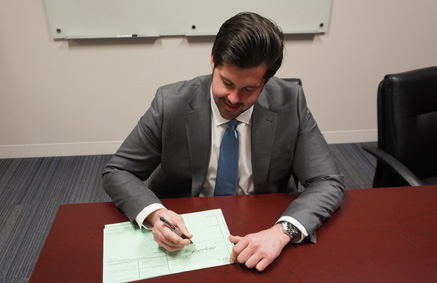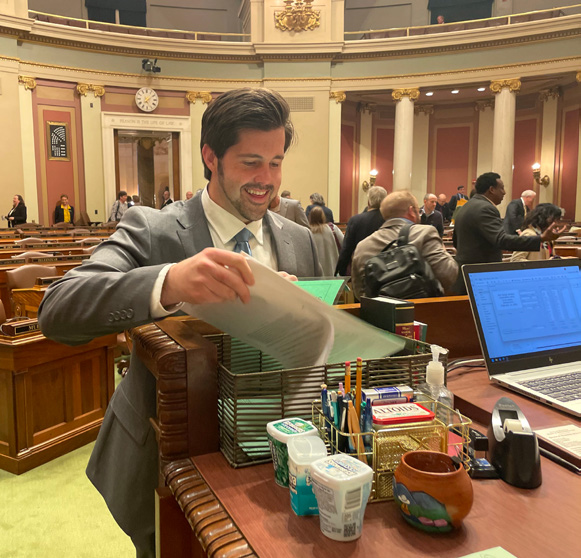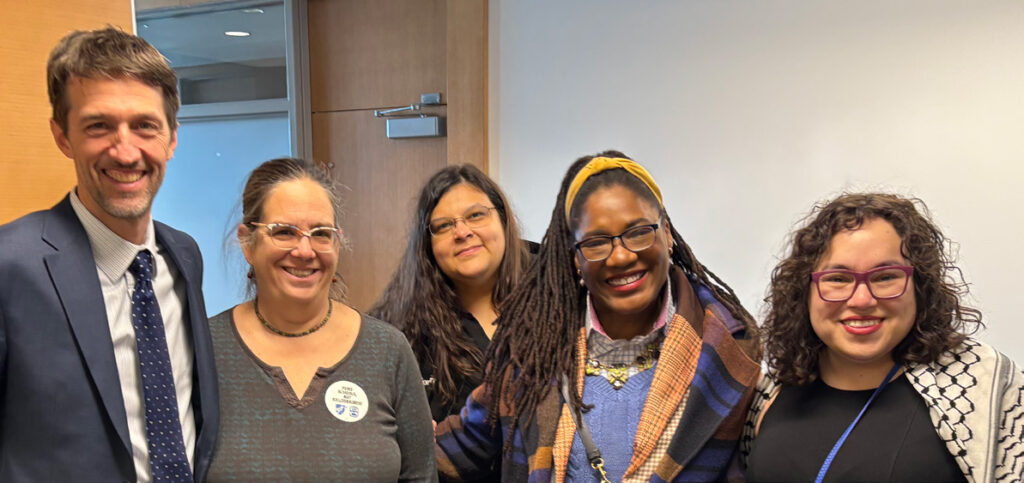The 2025-26 legislative session is fully underway after a rocky start due to unexpected vacancies in both chambers, a tie in the House and a one-seat DFL majority in the Senate. We have broken down everything that’s happened in the Legislature this session, along with how it has impacted our proposed bills.
The Minnesota House of Representatives
Because the November election resulted in a tied House—67 Republicans and 67 Democrats—the two parties first negotiated a power-sharing agreement in December . But in January, DFL Representative-elect Curtis Johnson resigned after a judge found that he did not live in the district, giving Republicans a temporary one-seat majority until the seat can be filled by a special election, which is scheduled for March 11.
Citing this temporary majority, Republicans walked back the power-sharing agreement and argued that they deserved full control of the chamber for the entire session. They also indicated that they would refuse to seat DFL Rep. Brad Tabke, who won his election by 14 votes.
There must be a quorum of at least 68 representatives present for the legislative session to officially begin. To stop Republicans from overriding the will of the voters by unseating Rep. Tabke, DFL members prevented a quorum by spending the first few weeks working in their districts instead of at the Capitol in St. Paul.
While the DFL members were working in their districts, Republican members ignored Secretary of State Steve Simon’s declaration that there was not a quorum and elected a Speaker, established committees and held hearings. However, after a court challenge, a judge ruled that any actions taking by Republicans during that time were invalid because a quorum was never reached, therefore the House was never formally organized.
After several weeks of negotiations, Republican Leader Lisa Demuth and DFL Leader Melissa Hortman reached a power-sharing deal in early February, outlined below:
- Allows Rep. Demuth to be Speaker for two years.
- Requires the committees be co-chaired by both parties and requires bills to have bipartisan support to leave a committee.
- Guarantees that Rep. Tabke will be seated.
- Allows for the creation of an Oversight Committee with a Republican majority.
- Specifies that no legislation can pass the chamber without 68 votes, which means any bill that passes the House must have bipartisan support.
The HD-54A election
Rep. Brad Tabke’s election was contested because 20 mail-in ballots were lost; however, six of those voters whose ballots were lost testified under oath that they voted for Tabke, meaning that even if those ballots were found, there was not enough support for challenger Aaron Paul to change the results. This decision was confirmed in a recount and upheld by a judge in early January.
Despite the fact that Rep. Tabke had clearly won his race, Republicans in the House said that they would not seat him, which would force the seat to a special election and override the will of the voters in 54A.
Minnesota Senate
The DFL currently holds the Minnesota Senate with a 34-33 majority. However, the Senate went to a temporary tie after the passing of Sen. Kari Dziedzic in December. The Senate operated under a power-sharing agreement while the parties were tied, but Democrats regained control after Sen. Doron Clark won a special election for Sen. Dziedzic’s seat.
What this means for our legislative priorities
This is a much tougher legislative environment than last session. Because the House started late, there is a significant backlog of bills that need to be filed, including our proposals around our top legislative priorities of pay and health care. Additionally , the current legislative makeup and the power-sharing agreement mean that legislation will need bipartisan support to pass the House.
Fortunately, our pension bill was filed and formally introduced on Feb. 27. Sponsored by Rep. Dan Wolgamott in the House and Sen. Heather Gustafson in the Senate, our bill proposes an unreduced career rule of 60 years of age and 30 years of service.
Our legislative priorities remain unchanged, and we will continue to advocate fiercely for improvements to pay, pensions and health care. Our union’s strongest resource is you—our members. When you share your stories by testifying at a hearing, attending a lobby day or legislative dinner, or inviting your elected officials to visit your local or school, it increases the chances that our bills move through the Legislature and become law. Building relationships with lawmakers is one of the most effective advocacy tools we have. If you have questions about how to get involved or specific policies, contact our lobby team at lobbyteam@edmn.org. If you want to organize a lobby day or invite a legislator to visit your local, contact your field staff.




